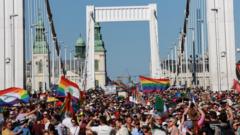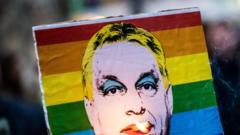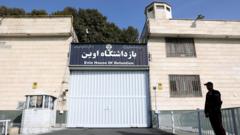In a spirited demonstration of unity, hundreds of thousands converge at Budapest Pride, defying government efforts to stifle expression and promote a message of support for human rights.
Massive Turnout at Budapest Pride Marks Solidarity Against Orban's Policies

Massive Turnout at Budapest Pride Marks Solidarity Against Orban's Policies
Budapest Pride sees historic attendance as thousands rally for LGBTQ+ rights, challenging government restrictions.
On Saturday, Budapest transformed into a sea of color as an estimated 100,000 to 200,000 people flooded the streets for the annual Pride march, traversing the iconic Elisabeth Bridge and along the banks of the Danube River. This year's event not only celebrated LGBTQ+ rights but also stood as a powerful statement against Prime Minister Viktor Orban's controversial policies, which participants vehemently opposed.
Following a significant drop in attendees last year—where just 35,000 showed up—the surge in turnout this year was largely fueled by dissatisfaction with Orban's recent legislative actions that have faced critics at home and abroad. Many participants utilized the space to express their frustrations with the Prime Minister's authoritarian-like governance. Creative banners and T-shirts featuring Orban's image—often embellished with makeup and jewels—offered both a sense of humor and a critique of his leadership style.
In a notable moment of solidarity, Budapest's Mayor Gergely Karacsony addressed the crowd, declaring, "We don’t look as though we were banned! We have triumphed over oppression!" His remarks underscored the tension between the local government and Orban's national administration, particularly given the financial challenges faced by city hall.
European Parliament member Li Andersson spotlighted the overarching message of the event, stating, "We're not just here for Pride; this is about all our fundamental rights." The contentious backdrop to this year's celebrations was a recently passed law by Orban's Fidesz party that redefined the framework of assembly rights, framing the portrayal of homosexuality as harmful to minors.
Despite fears of an official ban, local authorities allowed the parade to proceed, showcasing that ordinary citizens could mobilize and claim their right to assembly amidst restrictive legislation. Meanwhile, a police presence was noted, with a restrained approach observed during the festivities.
As Orban attended a separate event for newly graduated law enforcement, he reiterated the need for "order" in society, contrasting starkly with the vibrant scene at Pride. The mainstream media, aligned with the government, attempted to diminish the significance of the march, labeling it as chaotic and inappropriate.
In the days to come, the legality of the event may be contested in courts, posing critical questions about freedom of expression and the future of civil rights under Orban’s governance. No matter the outcome, the Pride parade has demonstrated the resolve of Budapest's citizens to stand united against discrimination and oppression.



















